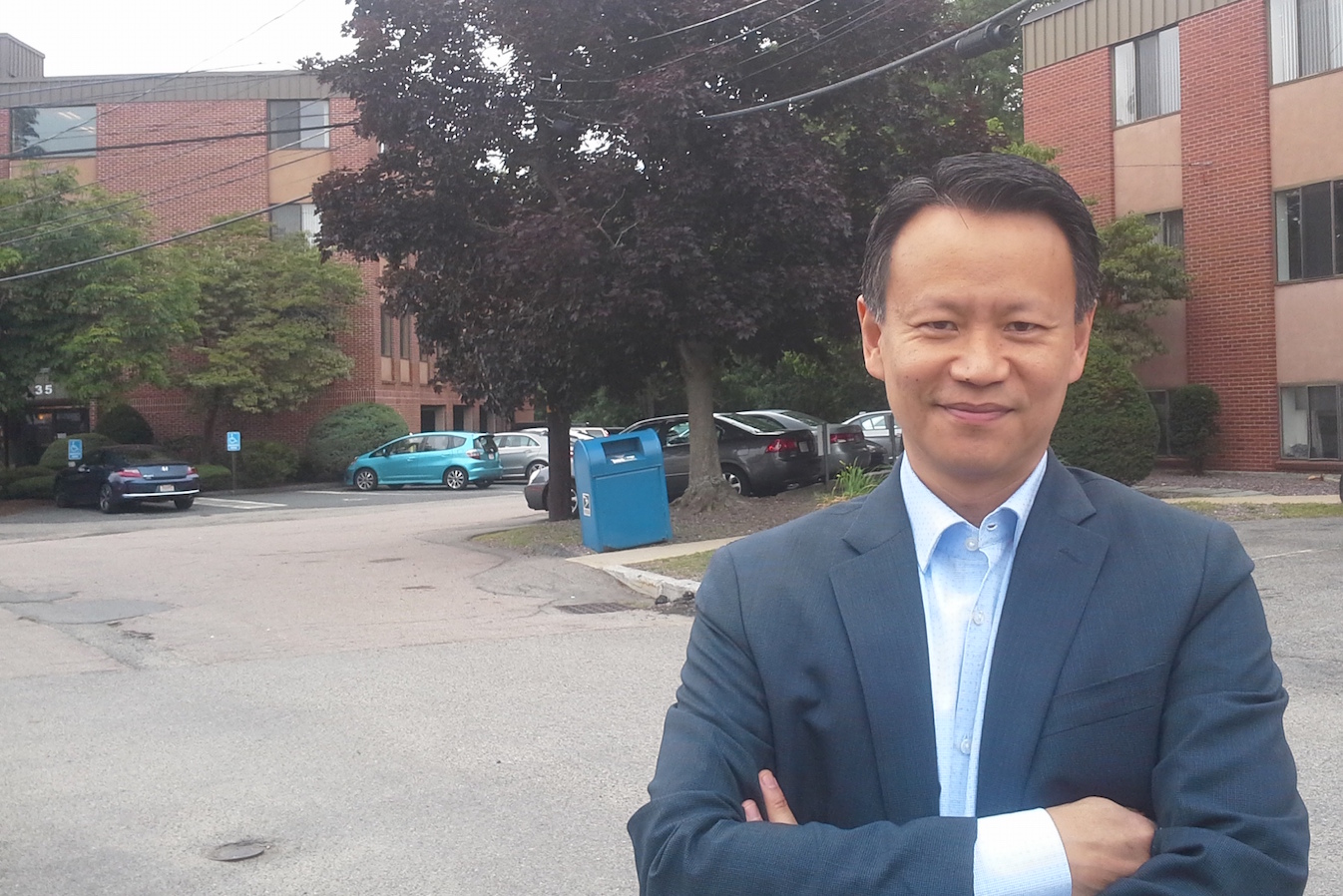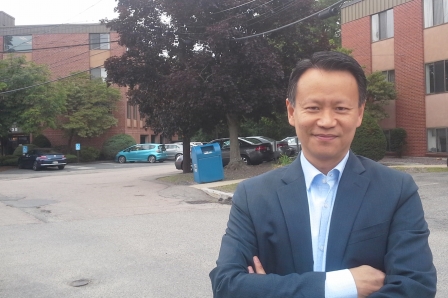From Art Collecting to Allego: Meet the Busiest CEO in Boston Tech

Yuchun Lee has a plan, or a thesis, for everything.
The tech entrepreneur is perhaps best known for leading Unica, a marketing software company that went public and was bought by IBM for $ 480 million in 2010. He was also a member of the famed MIT blackjack team in the ‘90s, and is still barred from certain casinos. Throw in self-described “Somerville slumlord” from the late ‘80s, and it’s safe to say Lee has a very broad set of skills that has served him well in his career.
These days, he’s the CEO of two different tech companies. One is Allego, a sales-training-by-video startup he co-founded in Needham, MA. The other is Clarabridge, a customer-experience software company, headquartered in Reston, VA, in the DC area. Lee (pictured) is also an executive in residence at venture firm General Catalyst Partners, and, for good measure, he serves on the board of Vertex Pharmaceuticals, one of the biggest public biotech companies around.
What’s most interesting is Lee’s business philosophy. Over lunch at an Italian restaurant this summer, I got a window into the life of a modern-day multitasker, someone who brings an entrepreneurial drive to almost everything he does, all while trying to retain an inner calm. His phone buzzed at least eight times during our meeting, but Lee wasn’t noticeably distracted.
And that says something about his mentality. Lee works on weekends, of course, but he says he has the temperament to spend time with family and simultaneously deal with work issues that come up. If he gets a negative phone call, for example, he tries not to let it affect his interactions with his kids. (It’s hard to verify the success of this approach, but based on Lee’s demeanor and experience, I would guess he’s uncommonly good at compartmentalizing different aspects of his life.)
But first, more about his day jobs. Allego is a 50-person startup Lee co-founded with sales-training expert Mark Magnacca. Their goal is to reshape how big companies train and coach salespeople, by using video technology on mobile devices to give feedback and share ideas. Allego is mostly self-funded, and its customers include John Hancock, Bullhorn, and Demandware, which is now part of Salesforce.
It’s early, but Allego is “at the right place in the adoption curve,” Lee says.
Meanwhile, Clarabridge has 300-plus employees and has raised north of $ 100 million in venture capital and growth equity. Its investors include General Catalyst, Summit Partners, and Lee himself, who took over as CEO in January (he was a board member before that). The 10-year-old company focuses on customer experience management—a fancy term for helping brands process and respond to customer feedback from things like surveys, phone calls, and social media.
Clarabridge uses natural language processing, text analytics, and other methods to try to understand the sentiment of customer feedback and “find the root cause” of any problem, Lee says. (The approach may have something in common with the customer-service aspect of companies like Intercom, TeleTech, Nuance, and Salesforce; also with customer-focused tech startups like Cogito, GetHuman, Help Scout, and even SessionM in mobile marketing.)
But surely, running two companies is more challenging—and problematic—than running one? Lee points out that Allego and Clarabridge, put together, are still smaller than his 2,000-strong enterprise marketing management group at IBM, where he was vice president and general manager after the Unica deal.
In any given week, Lee splits time between his companies’ offices in different cities. He seems to have a hands-off management style. “Good companies have a social contract,” he says. “You plan what you do, and you do what you plan.” With the right structure in place, he says, “I don’t need to hover over them.”
For logistics and planning, Lee says, his executive assistant, who has worked with him for 11-plus years, is indispensable. “She’s doing two jobs,” he says. What’s more, he trusts his assistant with issues that come up on a daily basis. “She has a model of me in her head. She knows what decision I’m going to make,” he says. That frees him up to do more with his time.
It’s still too early to say how things will work out, though. Both Allego and Clarabridge have been growing above projections, Lee says, but he didn’t share many specifics. With Brexit, the U.S. elections, and other uncertainties in the business climate, there are plenty of reasons to be cautious—unless you’re Lee. “I’ve been through four recessions and three wars,” he says. “These cycles don’t faze me.”
Lee was born in Taiwan and came to the U.S. when he was 13, settling in Houston, TX, by way of Natchez, MS, on the Mississippi River. His first job was as a busboy in a Houston restaurant. He started a software company in high school before coming to Boston to study electrical engineering and computer science at MIT in the mid-‘80s, and then working for Digital Equipment Corporation.
Interestingly, he says he’s never had a failed company. “There’s always a way,” he says.
But that doesn’t mean he and his companies haven’t made mistakes. The culture he has tried to instill over the years is one of intellectual honesty and fast error-correction. For instance, the 2016 business plans at both Allego and Clarabridge included “all sorts of assumptions—and 25 percent were wrong, dead wrong,” Lee says. He adds, “You have to call it out—‘this is wrong’—and you have to correct it quickly. That has saved my ass many times.”
Lee says he tells his staff, “I will make mistakes. But I will use good judgment.” He admits that when he does make a mistake, “it still hurts,” but that he has learned to deal with it “before it gets in the way.”
I asked Lee if he has an overarching question that he’s pursuing in his life’s work: a bigger theme in business, technology, psychology, whatever. He says it would have to do with “how to get every individual to reach their full potential as a person.”
While that sounds kind of corporate—see Microsoft’s mission ad from 2002, for example—I can imagine Lee spending time on coaching and mentoring his employees and executives. It fits with his style.
As we finished our pasta dishes, the talk turned to Lee’s various hobbies—which, by the way, no longer include blackjack. Even there, he has some clear operational guidelines.
Let’s start with art collecting: Lee says he tries to stick to “blue-chip” purchases, works by well-known artists (Picasso, Warhol) that will hold their considerable value. For options trading, he likes to go against the grain (“When people are running away, I am running in,” he says). And in wine collecting, he says, he drinks one bottle for every two he saves, and tries to just break even (“It’s my only hobby where I don’t make money”).
Two areas he says he doesn’t touch: real estate—maybe it goes back to the slumlord thing—and fancy cars. Though he admits he did think about buying a Lamborghini before being talked out of it. One of many stories for another time.
(16)


